外研版初一升初二暑假第11讲(进行时态)(共15张PPT)
文档属性
| 名称 | 外研版初一升初二暑假第11讲(进行时态)(共15张PPT) |  | |
| 格式 | zip | ||
| 文件大小 | 345.2KB | ||
| 资源类型 | 教案 | ||
| 版本资源 | 外研版 | ||
| 科目 | 英语 | ||
| 更新时间 | 2020-06-12 17:45:11 | ||
图片预览

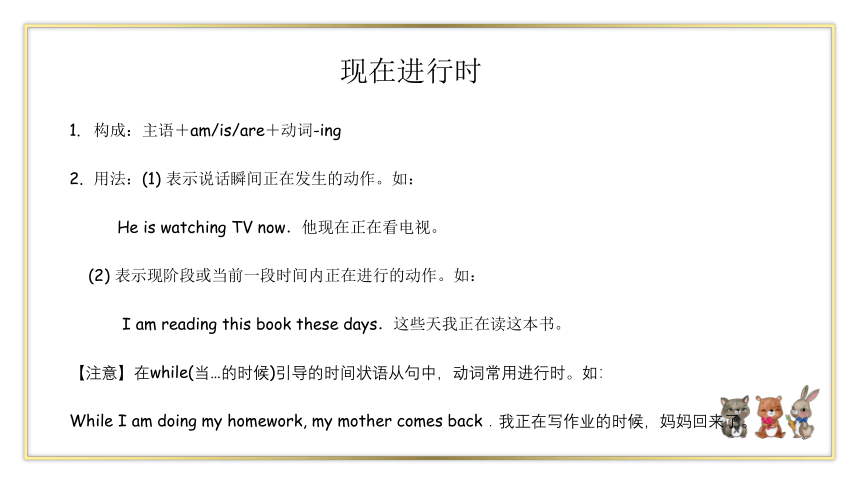
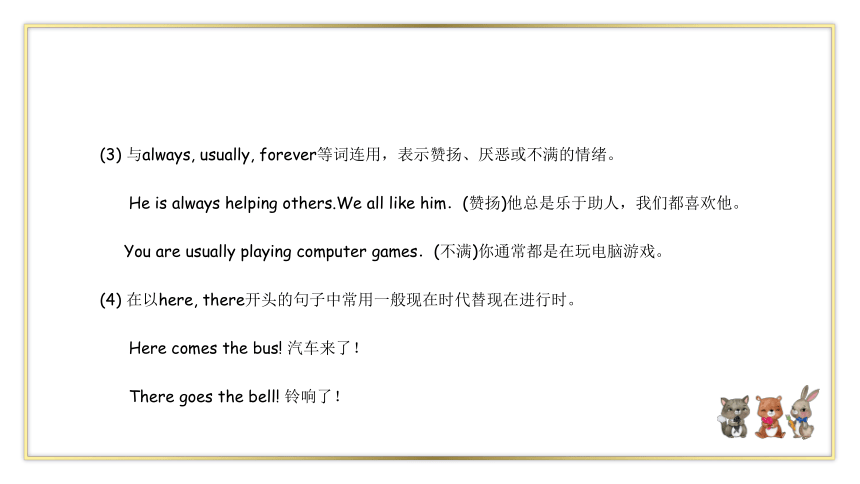
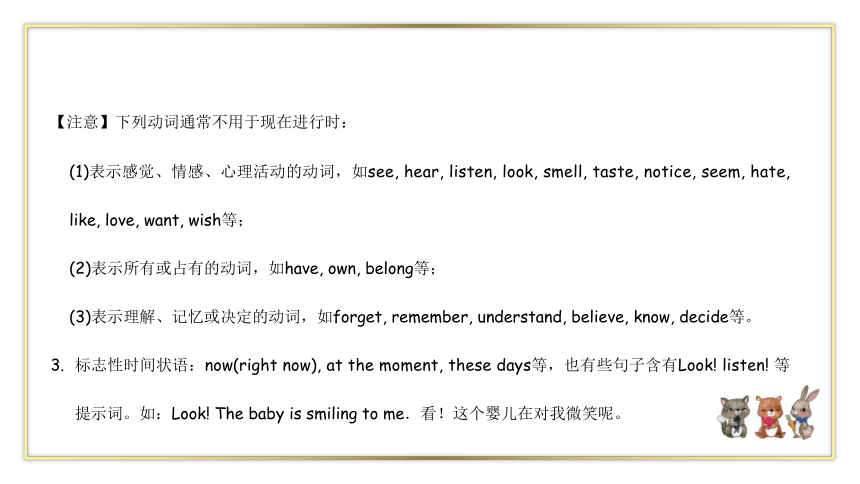
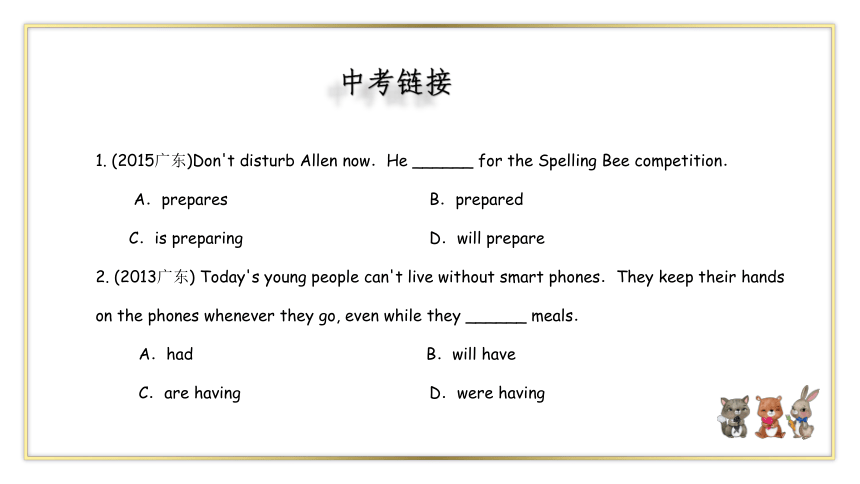
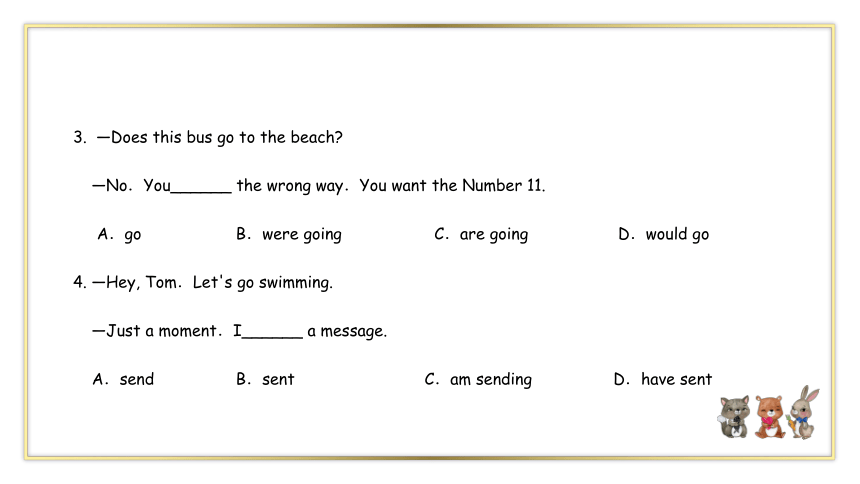
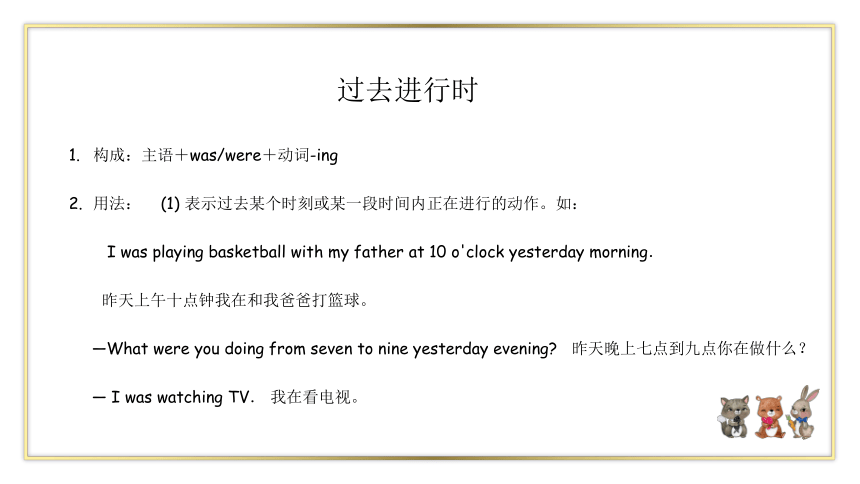
文档简介
(共15张PPT)
小
文
字
初二第11讲(进行时态)
构成:主语+am/is/are+动词?ing
用法:(1)
表示说话瞬间正在发生的动作。如:
He
is
watching
TV
now.他现在正在看电视。
(2)
表示现阶段或当前一段时间内正在进行的动作。如:
I
am
reading
this
book
these
days.这些天我正在读这本书。
【注意】在while(当…的时候)引导的时间状语从句中,动词常用进行时。如:
While
I
am
doing
my
homework,
my
mother
comes
back.我正在写作业的时候,妈妈回来了。
现在进行时
(3)
与always,
usually,
forever等词连用,表示赞扬、厌恶或不满的情绪。
He
is
always
helping
others.We
all
like
him.(赞扬)他总是乐于助人,我们都喜欢他。
You
are
usually
playing
computer
games.(不满)你通常都是在玩电脑游戏。
(4)
在以here,
there开头的句子中常用一般现在时代替现在进行时。
Here
comes
the
bus!
汽车来了!
There
goes
the
bell!
铃响了!
【注意】下列动词通常不用于现在进行时:
(1)表示感觉、情感、心理活动的动词,如see,
hear,
listen,
look,
smell,
taste,
notice,
seem,
hate,
like,
love,
want,
wish等;
(2)表示所有或占有的动词,如have,
own,
belong等;
(3)表示理解、记忆或决定的动词,如forget,
remember,
understand,
believe,
know,
decide等。
标志性时间状语:now(right
now),
at
the
moment,
these
days等,也有些句子含有Look!
listen!
等提示词。如:Look!
The
baby
is
smiling
to
me.看!这个婴儿在对我微笑呢。
1.
(2015广东)Don't
disturb
Allen
now.He
______
for
the
Spelling
Bee
competition.
A.prepares
B.prepared
C.is
preparing
D.will
prepare
2.
(2013广东)
Today's
young
people
can't
live
without
smart
phones.They
keep
their
hands
on
the
phones
whenever
they
go,
even
while
they
______
meals.
A.had
B.will
have
C.are
having
D.were
having
中考链接
3.
—Does
this
bus
go
to
the
beach?
—No.You______
the
wrong
way.You
want
the
Number
11.
A.go
B.were
going
C.are
going
D.would
go
4.
—Hey,
Tom.Let's
go
swimming.
—Just
a
moment.I______
a
message.
A.send
B.sent
C.am
sending
D.have
sent
构成:主语+was/were+动词?ing
用法:
(1)
表示过去某个时刻或某一段时间内正在进行的动作。如:
I
was
playing
basketball
with
my
father
at
10
o'clock
yesterday
morning.
昨天上午十点钟我在和我爸爸打篮球。
—What
were
you
doing
from
seven
to
nine
yesterday
evening?
昨天晚上七点到九点你在做什么?
—
I
was
watching
TV.
我在看电视。
过去进行时
(2)
句中含有when引导的时间状语从句,从句用一般过去时,主句用过去进行时,表示一个动作发生时,另外一个动作正在进行。如:
The
students
were
reading
their
books
loudly
when
Miss
Brown
went
into
the
classroom.
布朗小姐走进教室的时候学生们正在大声朗读。
(3)
句中含有while引导的时间状语从句,主从句动作在过去某个时间同时发生,则主从句谓语动词的时态都使用过去进行时,while表示“当……时候;同时”。如:
I
was
helping
my
mother
with
housework
while
my
brother
was
playing
games.
当我的弟弟在打游戏时,我在帮妈妈做家务。
(4)
与always等频度副词连用,表示过去频繁发生的习惯性动作,此时常带有赞赏、惊讶、厌恶、遗憾等感彩。
如:They
were
always
quarrelling.他们老是吵架。
(5)
“was
going
+动词不定式”表示过去打算做某事。如:
He
was
going
to
be
our
team
leader.他原打算当我们的队长。
标志性时间状语:then,
at
that
time/moment,
at
9
o'clock
yesterday
morning等。
1.
(2014广东)
—
I
didn't
see
you
at
the
beginning
of
the
party
last
night.
—I
______
on
my
biology
report
at
that
time.
A.worked
B.work
C.was
working
D.am
working
2.—What
were
you
doing
when
it
rained
heavily
last
night?
—I______
my
homework
at
home.
A.do
B.did
C.am
doing
D.was
doing
重难点理解
一般过去时与过去进行时混用
一般过去时:动作结束,侧重说明事实
过去进行时:动作未结束,侧重说明动作的持续过程
They
built
a
tall
building.他们建了一栋高楼。
They
were
building
a
tall
building.他们正在建一栋高楼。
While
I______
a
book
in
the
room,
my
brother
rushed
in.
A.am
reading
B.will
read
C.was
reading
D.read
2.
—Hainan
is
a
good
place
for
surfing.
—That's
why
I______
there
for
surfing
last
summer.
A.have
been
B.have
gone
C.have
left
D.went
1.
(2017北京)My
mother
______some
washing
when
the
telephone
rang.
A.does
B.did
C.is
doing
D.was
doing
2.
(2017河北)Don't
take
the
dictionary
away.I
______
it.
A.use
B.used
C.am
using
D.have
used
3.
(2017兰州)
When
you
______me
last
night,
I
______the
piano.
A.were
calling;
was
playing
B.were
calling;
played
C.called;
played
D.called;
was
playing
4.
(2017天门)
Hurry
up,
everyone!
The
school
bus
______
for
us.
A.waits
B.waited
C.was
waiting
D.is
waiting
5.
(2017南通)
—Sandy,
the
glass
is
broken.How
did
that
happen?
—Sorry,Mum.I
don't
know.I
______outside.
A.play
B.was
playing
C.have
played
D.am
playing
6.
(2017达州)—What's
the
matter,
Jack?
—I______
down
while
I______
on
the
ice.I
got
hurt
badly.
A.was
falling;
skated
B.fell;
was
skating
C.fell;
skated
D.was
falling;
was
skating
7.
—Why
did
the
car
hit
the
boy?
—Because
the
driver
______
on
the
phone
at
that
time.
A.talk
B.is
talking
C.was
talking
D.have
talked
8.
—Where
is
Linda?
I
can't
find
her
anywhere.
—She
______
the
flowers
in
the
garden.
A.waters
B.watered
C.is
watering
D.was
watering
9.
—I
called
you
at
half
past
nine
this
morning,
but
there
was
no
answer.
—Oh,
sorry.I
______
with
my
cousin
in
the
supermarket.
A.shopping
B.was
shopping
C.shopped
D.will
shop
10.
—Where
is
Joan?
—She
______
a
novel
in
her
study.
A.has
read
B.reads
C.will
read
D.is
reading
小
文
字
初二第11讲(进行时态)
构成:主语+am/is/are+动词?ing
用法:(1)
表示说话瞬间正在发生的动作。如:
He
is
watching
TV
now.他现在正在看电视。
(2)
表示现阶段或当前一段时间内正在进行的动作。如:
I
am
reading
this
book
these
days.这些天我正在读这本书。
【注意】在while(当…的时候)引导的时间状语从句中,动词常用进行时。如:
While
I
am
doing
my
homework,
my
mother
comes
back.我正在写作业的时候,妈妈回来了。
现在进行时
(3)
与always,
usually,
forever等词连用,表示赞扬、厌恶或不满的情绪。
He
is
always
helping
others.We
all
like
him.(赞扬)他总是乐于助人,我们都喜欢他。
You
are
usually
playing
computer
games.(不满)你通常都是在玩电脑游戏。
(4)
在以here,
there开头的句子中常用一般现在时代替现在进行时。
Here
comes
the
bus!
汽车来了!
There
goes
the
bell!
铃响了!
【注意】下列动词通常不用于现在进行时:
(1)表示感觉、情感、心理活动的动词,如see,
hear,
listen,
look,
smell,
taste,
notice,
seem,
hate,
like,
love,
want,
wish等;
(2)表示所有或占有的动词,如have,
own,
belong等;
(3)表示理解、记忆或决定的动词,如forget,
remember,
understand,
believe,
know,
decide等。
标志性时间状语:now(right
now),
at
the
moment,
these
days等,也有些句子含有Look!
listen!
等提示词。如:Look!
The
baby
is
smiling
to
me.看!这个婴儿在对我微笑呢。
1.
(2015广东)Don't
disturb
Allen
now.He
______
for
the
Spelling
Bee
competition.
A.prepares
B.prepared
C.is
preparing
D.will
prepare
2.
(2013广东)
Today's
young
people
can't
live
without
smart
phones.They
keep
their
hands
on
the
phones
whenever
they
go,
even
while
they
______
meals.
A.had
B.will
have
C.are
having
D.were
having
中考链接
3.
—Does
this
bus
go
to
the
beach?
—No.You______
the
wrong
way.You
want
the
Number
11.
A.go
B.were
going
C.are
going
D.would
go
4.
—Hey,
Tom.Let's
go
swimming.
—Just
a
moment.I______
a
message.
A.send
B.sent
C.am
sending
D.have
sent
构成:主语+was/were+动词?ing
用法:
(1)
表示过去某个时刻或某一段时间内正在进行的动作。如:
I
was
playing
basketball
with
my
father
at
10
o'clock
yesterday
morning.
昨天上午十点钟我在和我爸爸打篮球。
—What
were
you
doing
from
seven
to
nine
yesterday
evening?
昨天晚上七点到九点你在做什么?
—
I
was
watching
TV.
我在看电视。
过去进行时
(2)
句中含有when引导的时间状语从句,从句用一般过去时,主句用过去进行时,表示一个动作发生时,另外一个动作正在进行。如:
The
students
were
reading
their
books
loudly
when
Miss
Brown
went
into
the
classroom.
布朗小姐走进教室的时候学生们正在大声朗读。
(3)
句中含有while引导的时间状语从句,主从句动作在过去某个时间同时发生,则主从句谓语动词的时态都使用过去进行时,while表示“当……时候;同时”。如:
I
was
helping
my
mother
with
housework
while
my
brother
was
playing
games.
当我的弟弟在打游戏时,我在帮妈妈做家务。
(4)
与always等频度副词连用,表示过去频繁发生的习惯性动作,此时常带有赞赏、惊讶、厌恶、遗憾等感彩。
如:They
were
always
quarrelling.他们老是吵架。
(5)
“was
going
+动词不定式”表示过去打算做某事。如:
He
was
going
to
be
our
team
leader.他原打算当我们的队长。
标志性时间状语:then,
at
that
time/moment,
at
9
o'clock
yesterday
morning等。
1.
(2014广东)
—
I
didn't
see
you
at
the
beginning
of
the
party
last
night.
—I
______
on
my
biology
report
at
that
time.
A.worked
B.work
C.was
working
D.am
working
2.—What
were
you
doing
when
it
rained
heavily
last
night?
—I______
my
homework
at
home.
A.do
B.did
C.am
doing
D.was
doing
重难点理解
一般过去时与过去进行时混用
一般过去时:动作结束,侧重说明事实
过去进行时:动作未结束,侧重说明动作的持续过程
They
built
a
tall
building.他们建了一栋高楼。
They
were
building
a
tall
building.他们正在建一栋高楼。
While
I______
a
book
in
the
room,
my
brother
rushed
in.
A.am
reading
B.will
read
C.was
reading
D.read
2.
—Hainan
is
a
good
place
for
surfing.
—That's
why
I______
there
for
surfing
last
summer.
A.have
been
B.have
gone
C.have
left
D.went
1.
(2017北京)My
mother
______some
washing
when
the
telephone
rang.
A.does
B.did
C.is
doing
D.was
doing
2.
(2017河北)Don't
take
the
dictionary
away.I
______
it.
A.use
B.used
C.am
using
D.have
used
3.
(2017兰州)
When
you
______me
last
night,
I
______the
piano.
A.were
calling;
was
playing
B.were
calling;
played
C.called;
played
D.called;
was
playing
4.
(2017天门)
Hurry
up,
everyone!
The
school
bus
______
for
us.
A.waits
B.waited
C.was
waiting
D.is
waiting
5.
(2017南通)
—Sandy,
the
glass
is
broken.How
did
that
happen?
—Sorry,Mum.I
don't
know.I
______outside.
A.play
B.was
playing
C.have
played
D.am
playing
6.
(2017达州)—What's
the
matter,
Jack?
—I______
down
while
I______
on
the
ice.I
got
hurt
badly.
A.was
falling;
skated
B.fell;
was
skating
C.fell;
skated
D.was
falling;
was
skating
7.
—Why
did
the
car
hit
the
boy?
—Because
the
driver
______
on
the
phone
at
that
time.
A.talk
B.is
talking
C.was
talking
D.have
talked
8.
—Where
is
Linda?
I
can't
find
her
anywhere.
—She
______
the
flowers
in
the
garden.
A.waters
B.watered
C.is
watering
D.was
watering
9.
—I
called
you
at
half
past
nine
this
morning,
but
there
was
no
answer.
—Oh,
sorry.I
______
with
my
cousin
in
the
supermarket.
A.shopping
B.was
shopping
C.shopped
D.will
shop
10.
—Where
is
Joan?
—She
______
a
novel
in
her
study.
A.has
read
B.reads
C.will
read
D.is
reading
同课章节目录
- Module 1 Lost and found
- Unit 1 Whose bag is this?
- Unit 2 Are they yours?
- Unit 3 Language in use
- Module 2 What can you do ?
- Unit 1 I can play the piano
- Unit 2 I can run really fast
- Unit 3 Language in use
- Module 3 Making plans
- Unit 1 What are you going to do at the weekends?
- Unit 2 We're going to cheer the players.
- Unit 3 Language in use
- Module 4 Life in the future
- Unit 1 Everyone will study at home
- Unit 2 Every family will have a small plane.
- Unit 3 Language in use
- Module 5 Shopping
- Unit 1 What can I do for you?
- Unit 2 You can buy everything on the Internet
- Unit 3 Language in use
- Module 6 Around town
- Unit 1 Could you tell me how to get to the Nationa
- Unit 2 The London Eye is on your right.
- Unit 3 Language in use
- Revision module A
- Module 7 My past life
- Unit 1 I was born in a small village.
- Unit 2 I was born in Quincy.
- Unit 3 Language in use
- Module 8 Story time
- Unit 1 Once upon a time….
- Unit 2 Goldilocks hurried out of the house.
- Unit 3 Language in use
- Module 9 Life history
- Unit 1 He left school and began work at the age of
- Unit 2 He decided to be an actor.
- Unit 3 Language in use
- Module 10 A holiday journey
- Unit 1 What did you do?
- Unit 2 This morning we took a walk.
- Unit 3 Language in use
- Module 11 Body language
- Unit 1 They touch noses!
- Unit 2 Here are some ways to welcome them.
- Unit 3 Language in use
- Module 12 Western music
- Unit 1 It's so beautiful!
- Unit 2 Vienna is the centre of European classical
- Unit 3 Language in use
- Revision module B
